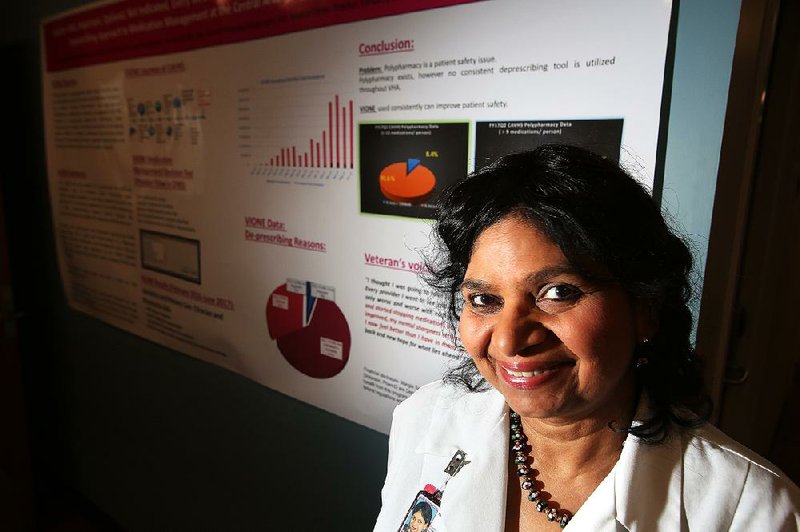By the time Dr. Sara Swathy Battar sees patients at the Veterans Affairs hospital in North Little Rock, they often have long lists of medications.
It struck Battar, the associate chief of staff for geriatrics and extended care for the Central Arkansas Veterans Health Care System, that there was no standardized medical tool for taking patients off their medications.
After some time, the same drugs that once saved someone's life are no longer needed and can have unpleasant or dangerous consequences.
"Every medicine is a poison with a desirable side effect," Battar said.
In 2016, Battar and her team developed a "deprescribing" method, which has saved the central Arkansas VA millions in cost avoidance and is now beginning to be implemented across the country.
The tool, called VIONE, uses five categories to help health care providers, patients and families work together to identify medications that are necessary and helpful and those that are not needed, which should be "deprescribed" -- stopped or decreased.
Battar's collaborators on the project were academic detail pharmacist Kim Dickerson and Tim Cmelik, chief of pharmacy for the central Arkansas VA.
The V in VIONE stands for vital, lifesaving medications that a patient should continue taking, such as diabetes medication. The I stands for important -- quality-of-life medications that improve the way a patient feels, such as those that treat pain and constipation. Those should also be continued, Battar says.
The O stands for optional, representing medications that don't make any difference in how a patient feels and could be discontinued.
"It's a chemical in your body," Battar said.
The N is for not indicated -- medications that do more harm than good and should be stopped.
Every medication has a reason to be taken -- that's the E, and one of Battar's mantras. If a patient or his family isn't sure why the patient is taking something, he should consider getting off it, Battar says.
Since VIONE was implemented at the central Arkansas VA about 2½ years ago, the method has saved the system an annualized cost of about $2.5 million. The team reviewed more than 8,000 veterans' medical regimens and "deprescribed" more than 14,000 medications -- an average of 1.7 medications per person reviewed, Battar said.
It's a simple approach, but it's something patients and families often don't think about, Battar said. Hot Springs resident Kim McCraw said she hadn't.
THE SPARK
McCraw had cared for her husband, Tom, by herself for eight years. The Air Force veteran had been diagnosed with early-onset Alzheimer's disease at age 55. The disease had transformed "a man who had the patience of Job" into someone who was constantly agitated and unable to communicate, she said.
He was prescribed low doses of antipsychotic drugs, then hospitalized. The illness, along with the four medications he was taking, eventually put him in a fog, nearly sedating him, she said.
Then Battar proposed taking him off one drug at a time to see if it would make a difference.
"The same medication that helped fix this man -- maybe he didn't need it anymore," McCraw said.
Later, when VA staff members called her to say that her husband was up and walking, she thought they were talking about the wrong patient. Her husband hadn't walked in months.
As the Alzheimer's took its toll, McCraw said her husband wasn't always verbal, but going off some of his medications during his last months of life returned the "spark" of who he was previously. He died in April.
Because of that, she said, her memories of the visit the day before he died are ones where he was mentally present and loving. She remembers his joy while listening to music, him telling her that her purple shirt looked beautiful, him telling her that he loved her.
"It didn't save his life, but it gave him a quality of life in his last months that he would not have had otherwise," McCraw said. "They brought a piece of him back."
THE RIPPLES
Many of her patients are elderly or frail, Battar said. They can have a plethora of ailments, ranging from long-term illnesses to past injuries, with prescriptions to match.
The thought of someone on so many medications toward the end of his life makes her squirm, Battar said.
Some might have seen a private specialist for aches, pains and other complaints, while others might have a health condition such as diabetes. Some might get over-the-counter medications for constipation, headaches, stomachaches, coughs, colds and other conditions that go away in a few days.
"They do not realize that all of those medicines can fight with each other," Battar said.
Additionally, some patients may not consistently take all of the medications they are prescribed, but get refills anyway, which is costly for the VA. Lots of prescriptions can also result in opioid addiction and abuse, Battar said, which is something else her system can address.
Nationally, about 40 percent of adults aged 65 and older were taking five or more medications in 2010, compared with about 13 percent in 1998, according to a 2010 study from researchers at Oregon State University.
VIONE was identified as a "gold status" practice in a Shark Tank-style competition encouraging innovative practices in the national VA system in 2017. It was selected for national dissemination in May by the U.S. Department of Veterans Affairs Diffusion of Excellence office.
Battar has shared the method with 26 other VA hospitals across the nation, at their request, she said. Some have already started implementing it. She said she hopes VIONE will become a household name in the medicine world.
"We have created some small ripples, and now we are seeing some huge tidal waves," Battar said.
Metro on 09/19/2018
